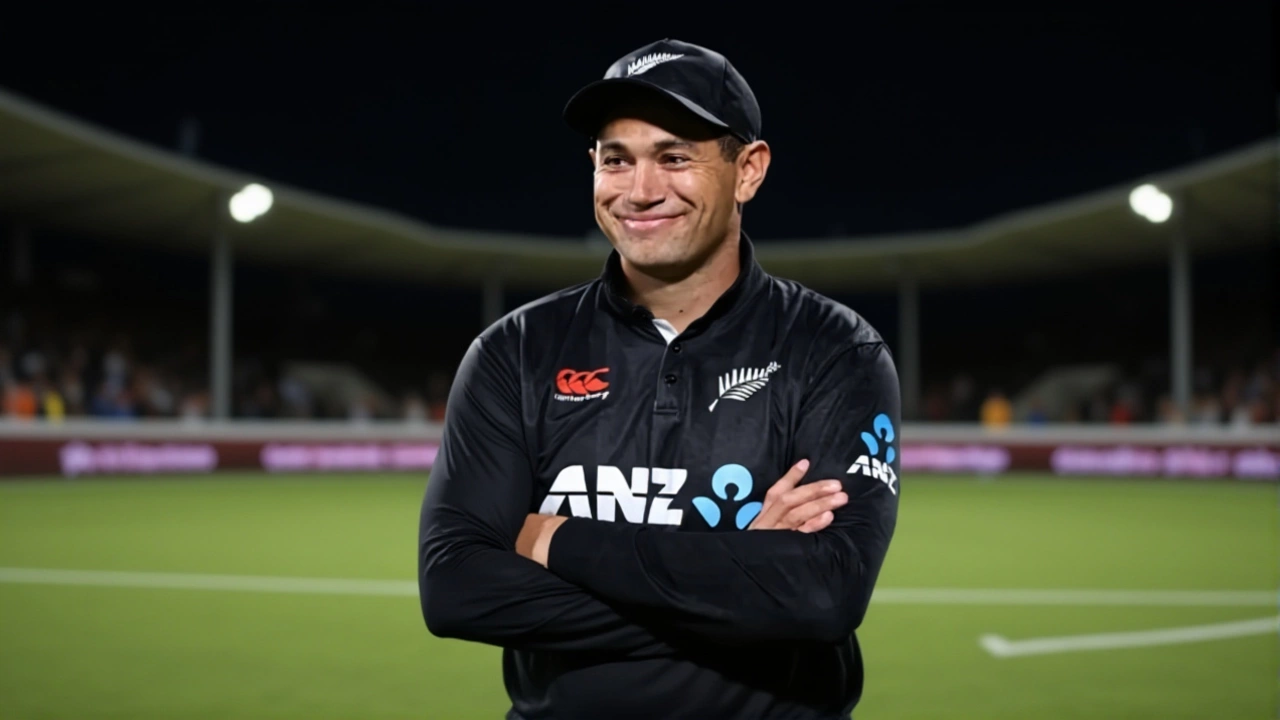
When Ross Ernest Taylor, former New Zealand captain and one of the country’s most‑capped batsmen, announced on 5 September 2025 that he was coming out of retirement to suit up for Samoa, the cricketing world took a collective breath.
Taylor posted a short video on his Instagram account, saying, “I’m officially back. Proud to play for Samoa – it’s more than a comeback, it’s about honouring my heritage, my village, my family.” The announcement came just days before the ICC Asia‑East Asia Pacific T20 Qualifier in Oman, where the Samoan side hopes to clinch one of the two coveted spots for the 2026 T20 World Cup.
From Black Caps to Pacific Islands: A career in snapshots
Born on 8 March 1984 in Leicester, New Zealand, the left‑handed powerhouse amassed 112 Tests, 236 ODIs and 102 T20Is for the Black Caps. He ranks second only to Kane Williamson in runs for New Zealand and sits behind captain Kane Williamson on the all‑time Test runs list. Between 2011 and 2017, Taylor captained the side, leading them to the 2015 World Cup final.
After hanging up his boots in April 2022, he spent three years away from the international arena, playing occasional franchise cricket and coaching at the grassroots level. The cooling‑off period prescribed by the International Cricket Council was a technical hurdle, but one he cleared by August 2025, making him eligible for a nation other than New Zealand.
Eligibility, passports and the ICC rulebook
The ICC’s eligibility code states that a player who has represented one full member must wait three years before switching allegiance to another member – full or associate – provided they hold a valid passport of the new country. In Taylor’s case, his mother’s Samoan roots allowed him to obtain a Samoan passport, a process overseen by the Samoan Cricket Association.
“It’s about more than cricket; it’s personal,” said David Fofou, president of the Samoan Cricket Association, in a briefing on 5 September. “Ross brings experience, mentorship and a bridge between our diaspora and the islands.”
Samoa’s cricketing dream: From associate member to World Cup hopeful
Despite being an ICC associate member since 2000, Samoa has never qualified for a major ICC event. Ranked 38th in the world, the team’s ambitions hinge on the upcoming qualifier, where the top two of eight competing nations will secure places at the 2026 T20 World Cup in India and Sri Lanka.
The Samoan squad, announced earlier this month, features a mix of locally‑grown talent and overseas‑based players. Captain Roberto Vai leads a side that includes coach James Taylor (no relation) and 12 youngsters from the domestic league.
Qualifier in Oman: The road to Dubai
The ICC Asia‑East Asia Pacific Qualifier runs from 15 to 25 September 2025 at the Al Bustan Cricket Stadium in Muscat, Oman. Eight teams—Samoa, Japan, Malaysia, Fiji, Vanuatu, Papua New Guinea, Papua New Guinea II and the United Arab Emirates—are split into two groups. Samoa lands in Group B alongside Japan, Malaysia and Fiji.
Taylor’s first two warm‑up matches ended in modest scores: 12 runs against Japan and 8 against Malaysia, according to a report by Navbharat Times on 5 September. Critics wondered whether a 41‑year‑old, long‑out of the international spotlight, could truly influence a side that has never faced a full‑member nation.
“Those numbers don’t tell the whole story,” argued Trevor Sole, former chairman of New Zealand Cricket. “His presence in the dressing room, the way he reads the game, will be invaluable for the younger Samoans.”
Reactions from the cricketing community
Fans on social platforms greeted the news with a mixture of excitement and skepticism. A trending hashtag #TaylorForSamoa trended in both New Zealand and Pacific Island circles. Former All‑Black All‑rounder Chris Cairns posted, “If anyone can lift an associate side, it’s Ross. Let’s see what this legacy looks like.”
Meanwhile, the ICC’s chief executive, Sir Richie Richardson, praised the move as “a celebration of cricket’s global family” during a press conference on 6 September.
Challenges ahead: Form, fitness and the pressure of expectation
At 41, Taylor faces a grueling schedule: two matches a day, a humid climate, and a handful of local players still learning the nuances of “death overs”. His fitness regimen now includes daily swimming in Muscat’s sea‑water pool and yoga to maintain flexibility.
Analysts from ESPNcricinfo note that the Samoan batting line‑up averages just 14.2 runs per wicket in List‑A games, a statistic that will need a swift lift if they hope to finish in the top two.
Beyond the numbers, the cultural impact could be profound. A successful run might spur increased funding from the Samoan government, inspire school‑level participation, and perhaps even prompt the ICC to reconsider the associate‑full‑member pathway.
What’s next if Samoa qualifies?
Should Samoa clinch a spot, they would join eight other qualifiers in the 2026 T20 World Cup, sharing a stage with powerhouses like India, England and Australia. The exposure could attract sponsorship deals, improve infrastructure (a new grass‑root stadium has already been proposed for Apia), and provide a platform for Samoan talent to secure contracts in leagues such as the IPL or CPL.
For Taylor, the personal payoff is equally meaningful. “Playing for my mother’s island, hearing the crowd chant in Samoan, that’s a feeling you can’t buy,” he told reporters at the hotel lobby in Muscat. “If we make history, it’ll belong to every kid on the islands watching on a tiny TV.”
Frequently Asked Questions
How does Taylor’s return affect Samoa’s chances of qualifying?
Taylor brings top‑level experience, strategic insight and a leadership aura that can lift the morale of a largely inexperienced squad. While his own scores in the warm‑ups were modest, his influence on younger batsmen could translate into better partnerships and tighter fielding, improving Samoa’s odds of finishing in the top two.
What ICC rule allows a player to switch national teams?
According to the ICC Eligibility Regulations, a player who has represented a full member must complete a three‑year cooling‑off period and hold a valid passport of the new country. Taylor satisfied both requirements after his last game for New Zealand in April 2022 and the acquisition of a Samoan passport.
Who are the other teams in the Oman qualifier?
Eight teams are contesting the qualifier: Samoa, Japan, Malaysia, Fiji, Vanuatu, Papua New Guinea, United Arab Emirates and a development side from the Philippines. They are split into two groups, with the top two overall qualifying for the World Cup.
What could be the long‑term impact on Samoan cricket?
A successful qualification would likely trigger increased funding from both the Samoan government and private sponsors, spark grassroots programmes in schools, and possibly lead to the construction of a dedicated international‑standard venue in Apia. It could also open pathways for Samoan players to enter global franchise leagues.
How have former teammates responded to Taylor’s decision?
Several former Black Caps, including Kane Williamson and Tim Southee, posted supportive messages on social media, highlighting his professionalism and wishing him luck on the new journey.
